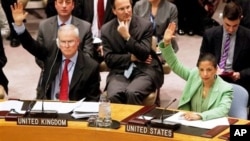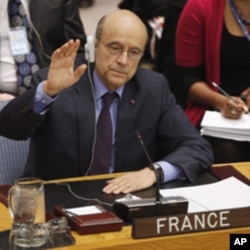The U.N. Security Council has authorized a No-Fly Zone over Libya, paving the way for possible air strikes. The council’s action comes on the heels of a warning from leader Moammar Gadhafi, who said Thursday he would have "no mercy" on rebels as his troops advance on their stronghold in the eastern city of Benghazi.
The vote was close. Ten council members voted in favor while five countries abstained - China, Russia, Germany, Brazil and India. There were no votes against. Only nine of the Security Council’s 15 members are required to vote in favor, with no vetoes, for a resolution to be adopted.
There were reports of fireworks and celebratory gunfire from Benghazi following the adoption of Resolution 1973.
The resolution calls for an immediate cease-fire and a complete end to the violence. It also authorizes States to take "all necessary measures" to enforce the ban on flights in order to protect civilians in areas under threat of attack, including Benghazi. Those measures are likely to include targeted air strikes on Libyan military defenses. But the resolution does not authorize any ground invasion, expressly excluding the possibility of a "foreign occupation force".
French Foreign Minister Alain Juppé, who came to New York for the vote, said his country, along with others - including Arab states, are ready to implement the No-Fly Zone.
"We have very little time left. It is a matter of days. It is perhaps a matter of hours. Every day, every hour we see the closing of the clamp on the civilians and the population of Benghazi. Each day, each hour that passes raises the weight on our shoulders. We should not arrive too late. The Security Council should make sure that law and democracy continue and that democracy prevails," he said.
Related video report by Meredith Buel
In a televised speech ahead of the vote, Moammar Gadhafi warned that his forces would begin a counter-offensive to take back Benghazi. He offered amnesty to those who put down their weapons, but to those who do not he promised "no mercy or compassion."
Several council members cited his repeated belligerence against his people, his loss of legitimacy and the need to avoid more bloodshed in their support for the resolution, which they said is essentially humanitarian in its scope.
But there was also great reluctance in the council to authorize the use of force. Russia and China refrained from using their veto, but both expressed their doubts after the vote.
Russian Ambassador Vitaly Churkin said a whole range of questions had not been adequately answered, including how the No-Fly Zone would be enforced, the rules of engagement and limits to the use of force. While China’s envoy Li Baodong said Beijing is always against the use of force in international relations.
Germany also broke with its European colleagues on the council and abstained over concerns of being drawn into a protracted military conflict.
But the United States, which had also appeared reluctant to support a No-Fly Zone earlier in the week, put its full support behind the resolution. Ambassador Susan Rice welcomed its passage. "This resolution should send a strong message to Colonel Gadhafi and his regime that the violence must stop, the killing must stop and the people of Libya must be protected and have the opportunity to express themselves freely," she said.
On Saturday the Arab League requested the council authorize the No-Fly Zone and diplomats have said that Arab countries will participate in it. Qatar, Jordan and the United Arab Emirates have all been floated as possibilities to join the United States, Britain and France.
Libya’s Deputy U.N. Ambassador, Ibrahim Dabbashi, who was among the first to break with the regime, urged the international community to move immediately and do whatever is possible to protect vulnerable civilians in Libya.
In a statement, the U.N. Secretary-General, who is on his way to the region, welcomed the resolution. Ban Ki-moon said given the critical situation on the ground he expected "immediate action" on its provisions.
In addition to the call for the ban on flights, the resolution also expands and strengthens sanctions imposed by the council nearly three weeks ago in Resolution 1970. The additional measures include freezing the assets of more individuals and entities -- including the Libyan Central Bank and the National Oil Company, expanding a travel ban and tightening enforcement of the arms embargo.




















